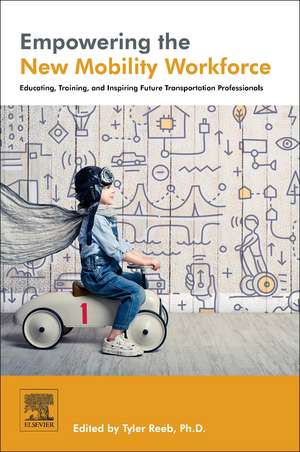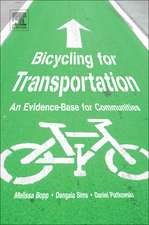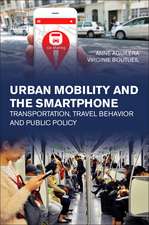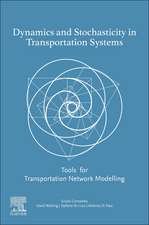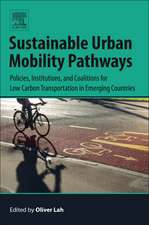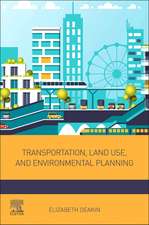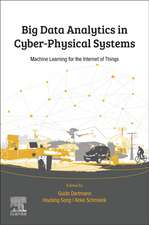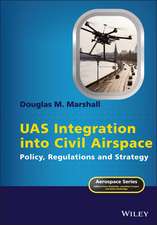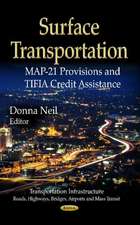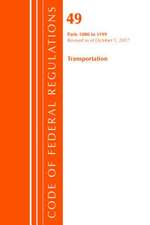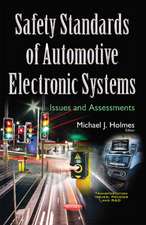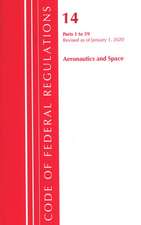Empowering the New Mobility Workforce: Educating, Training, and Inspiring Future Transportation Professionals
Editat de Tyler Reeben Limba Engleză Paperback – 18 iun 2019
This book will empower readers to establish ongoing communities of practice that cultivate sustainable career pathways that respond to ever-evolving socioeconomic trends and transformational technologies.
- Provides a comprehensive assessment of the new technologies and consumer attitudes driving change in personal vehicle, mass transit, active transportation, and goods movement, both domestically and internationally
- Identifies the career pathways, experiential learning models, and types of curriculum needed to prepare emerging professionals to develop and operate transportation systems of the future
- Emphasizes, through case studies, innovative practices emerging in public- and private-sector transportation organizations
- Draws on key work conducted in the United States and around the world, acknowledging the increasing interconnectedness of transportation systems between countries, economies and social networks that transcend national boundaries
Preț: 575.55 lei
Preț vechi: 787.16 lei
-27% Nou
Puncte Express: 863
Preț estimativ în valută:
110.17€ • 115.74$ • 92.58£
110.17€ • 115.74$ • 92.58£
Carte tipărită la comandă
Livrare economică 04-18 martie
Preluare comenzi: 021 569.72.76
Specificații
ISBN-13: 9780128160886
ISBN-10: 0128160888
Pagini: 440
Dimensiuni: 152 x 229 x 25 mm
Greutate: 0.59 kg
Editura: ELSEVIER SCIENCE
ISBN-10: 0128160888
Pagini: 440
Dimensiuni: 152 x 229 x 25 mm
Greutate: 0.59 kg
Editura: ELSEVIER SCIENCE
Public țintă
1) Researchers and graduate students in transportation management, logistics, supply chain management, and transportation engineering, 2) Transportation practitioners such as transportation managers, transportation planners, human resource directors, workforce development specialists, and 3) Transportation officials in Federal DOTs and State DOTsCuprins
Part 1: Demographic Shifts
1. How demographics are changing our vision of transportation systems
2. Recruiting underrepresented populations to the transportation workforce
3. Passing the torch from Baby Boomers to Millennials and future generations
4. Why language acquisition is essential in preparing Millennial workers for transportation careers
5. Why K-12 is critical to recruiting the next generation of transportation professionals
6. Middle-skill transportation jobs to rebuild the middle class
Part 2: Transformational Technology
7. Why technology is changing the skills and competencies for the future
8. Why old-school skills are just as critical as high-tech skills
9. Using technology to teach technological skills and competencies
10. Geospatial information systems technologies
11. Connected vehicles and connected corridors
12. Critical telecommunications and information-technology skill sets
Part 3: Talent Pipelines and Career Pathways
13. How career pathways are constructed and understood
14. When to develop a pipeline, pathway, or career ladder
15. Employer-driven transportation workforce development models
16. Workplace learning
Part 4: The Changing Role of Transportation Agencies
17. State DOTs
18. MPOs
19. Civic Markets for Smart Cities
20. Balancing urban and rural services
21. Transportation consultants
Part 5: Transportation Networks for the Mobility Revolution
22. New Collar Jobs and skills-driven training and curriculum
23. Linking transportation research, workforce, education, and employer communities
24. Online micro credentialing for displaced and incumbent workers
25. Virtual networks for career choices
26. Exemplary innovators in building the next-generation mobility workforce
27. Partnership tools as critical engines for change
1. How demographics are changing our vision of transportation systems
2. Recruiting underrepresented populations to the transportation workforce
3. Passing the torch from Baby Boomers to Millennials and future generations
4. Why language acquisition is essential in preparing Millennial workers for transportation careers
5. Why K-12 is critical to recruiting the next generation of transportation professionals
6. Middle-skill transportation jobs to rebuild the middle class
Part 2: Transformational Technology
7. Why technology is changing the skills and competencies for the future
8. Why old-school skills are just as critical as high-tech skills
9. Using technology to teach technological skills and competencies
10. Geospatial information systems technologies
11. Connected vehicles and connected corridors
12. Critical telecommunications and information-technology skill sets
Part 3: Talent Pipelines and Career Pathways
13. How career pathways are constructed and understood
14. When to develop a pipeline, pathway, or career ladder
15. Employer-driven transportation workforce development models
16. Workplace learning
Part 4: The Changing Role of Transportation Agencies
17. State DOTs
18. MPOs
19. Civic Markets for Smart Cities
20. Balancing urban and rural services
21. Transportation consultants
Part 5: Transportation Networks for the Mobility Revolution
22. New Collar Jobs and skills-driven training and curriculum
23. Linking transportation research, workforce, education, and employer communities
24. Online micro credentialing for displaced and incumbent workers
25. Virtual networks for career choices
26. Exemplary innovators in building the next-generation mobility workforce
27. Partnership tools as critical engines for change
